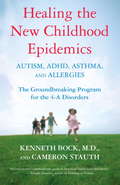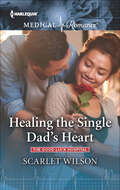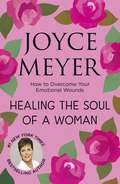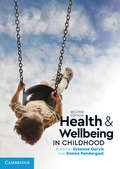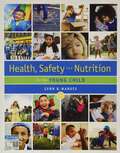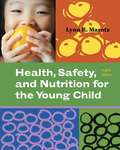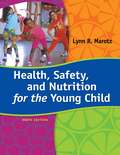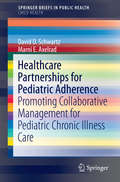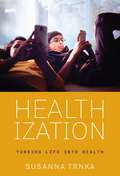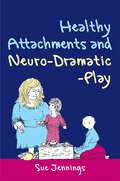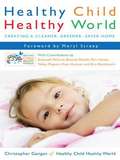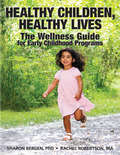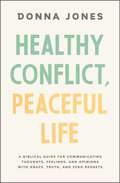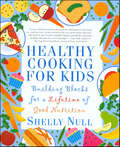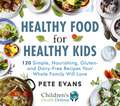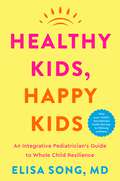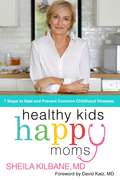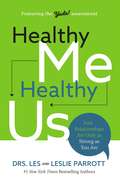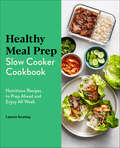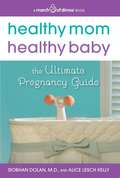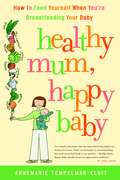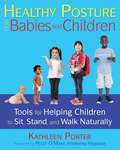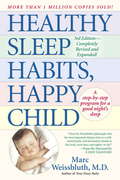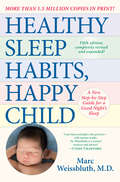- Table View
- List View
Healing the New Childhood Epidemics: Autism, ADHD, Asthma, and Allergies
by Cameron Stauth Kenneth BockAutism is an epidemic: It has spiked 1,500 percent in the last twenty years. ADHD, asthma and allergies have also skyrocketed over the same time period. One of these conditions now strikes one in every three children in America. But there is hope. Leading medical innovator Kenneth Bock, M. D. , has helped change the lives of more than a thousand children, and in this important book, with a comprehensive program that targets all four of the 4-A disorders, he offers help to children everywhere. This is the book that finally puts hope within reach. Doctors have generally overlooked the connections among the 4-A disorders, despite their concurrent rise and the presence of many medical clues. For years the medical establishment has considered autism medically untreatable and utterly incurable, and has limited ADHD treatment mainly to symptom suppression. Dr. Bock and his colleagues, however, have discovered a solution - one that goes to the root of the problem. They have found that deadly modern toxins, nutritional deficiencies, metabolic imbalances, genetic vulnerabilities and assaults on the immune and gastrointestinal systems trigger most of the symptoms of the 4-A disorders, resulting in frequent misdiagnosis and untold misery. Dr. Bock's remarkable Healing Program, drawing on medical research and based on years of clinical success, offers a safe, sensible solution that is individualized to each child to help remedy these root causes. The biomedical approach to autism, ADHD, and the other 4-A epidemics, as innovated by Dr. Bock and some of America's finest integrative physicians, is one of the most promising and exciting medical movements of our time. In this eminently readable account, written by Dr. Bock in collaboration with critically acclaimed author Cameron Stauth, you will meet children and parents whose dramatic stories will inspire you to change the life of your own child. This program may be the help that you have been praying for. From the Hardcover edition.
Healing the Single Dad's Heart: The Good Luck Hospital (The Good Luck Hospital #1)
by Scarlet WilsonHe never meant to love again……until he goes to Vietnam!In this The Good Luck Hospital story, widower, Scottish GP Joe and his young son are in Vietnam for a fresh start. Volunteering at a humanitarian hospital, Joe’s surprised by how quickly he feels at home - which could have something to do with beautiful, intriguing Dr. Lien, his colleague and unofficial tour guide. With her, Joe glimpses a tantalizing future…if he can let go of the past.Good Luck Hospital duetBook 1 — Healing the Single Dad’s HeartBook 2 — Just Friends to Just Married?“I treasured Tempted by the Hot Highland Doc by Scarlet Wilson. Everything appealed to me…. I enjoyed the plot and pacing of the story. The hero was divine and the heroine was so very lovable. It was a treat to read and I look forward to more by this author.”— Goodreads“What an absolutely entertaining, fast-paced, heartfelt medical romance Ms. Wilson has delivered in this book, encompassing two wonderful main characters that are so right for each other; compelling dialogue that had me hooked and wanting to know more….”— Harlequin Junkie on Island Doctor to Royal Bride?
Healing the Soul of a Woman: How to overcome your emotional wounds
by Joyce MeyerCan a woman who has been deeply hurt by life's circumstances be healed, heart and soul? If she has been wounded by a man she loved and trusted, can she love and trust again? As a woman who endured years of abuse, abandonment, and betrayal by those closest to her, Joyce Meyer can answer with a resounding "yes!"Meyer's positivity comes from living her own journey, and from seeing so many women who don't believe they can fully overcome their pain-or even know where to begin-find the guidance they need in the life-changing wisdom of the Bible.Meyer's bestseller Beauty for Ashes told of her personal story of healing. Now, with the passage of more time, HEALING THE SOUL OF A WOMAN delves deeper into Joyce's story and the journey of healing for all women. Each chapter guides you through whatever obstacles may be holding you back to find your true destiny as God's beloved. God can heal all pain, and He wants to do this in you. Let HEALING THE SOUL OF A WOMAN be the first step toward the wonderful, joyful future God intends for you.
Health and Wellbeing in Childhood
by Donna Pendergast Susanne GarvisThe period from birth to 12 years of age can have significant consequences for ongoing educational success, resilience and participation in society. This book provides a comprehensive introduction to a range of topics and issues in health and wellbeing education, and equips pre and in-service educators with the skills to promote and teach health and wellbeing in the classroom. Health and Wellbeing in Childhood is structured around three major themes: dimensions, applications and innovations. The authors recognise the diversity and complexity of health and wellbeing in education, with subjects ranging from communication development to child safety, nutrition to resilience, and friendships to social-emotional wellbeing. The book draws on the most contemporary research to explore issues such as technology, bullying and body image. Each chapter features numerous examples, case studies and links to relevant curriculum documents and frameworks, and readers are encouraged to reflect upon and contextualise the material presented.
Health and Wellbeing in Childhood
by Donna Pendergast Susanne GarvisThe period from birth to twelve years is crucial in a child's development and can significantly impact future educational success, resilience and participation in society. Health and Wellbeing in Childhood, 2nd edition provides readers with a comprehensive foundation in health and wellbeing education across key priority areas, covering physical, social and emotional learning and development. This edition has been thoroughly updated to include the latest research and resources and incorporates expanded material on diversity, mental health and contemplative practice. Learning is supported through a suite of features including key terms, case studies, links to curriculum documentation, reflective activities and end-of-chapter questions. A new instructor companion website features a curated suite of reading materials, extension questions and sample responses. Written by an expert author team comprised of leading academics and practitioners, Health and Wellbeing in Childhood equips readers with the knowledge and skills to promote and implement effective practice in the field.
Health, Safety, And Nutrition For The Young Child
by Lynn R. MarotzHEALTH, SAFETY, AND NUTRITION FOR THE YOUNG CHILD, 10th Edition, covers contemporary health, safety, and nutrition needs of infant through school-age children--and guides teachers in implementing effective classroom practices--in one comprehensive, full-color volume. Concepts are backed by the latest research findings and linked to NAEYC standards. The book emphasizes the importance of respecting and partnering with families to help children establish healthy lifestyles and achieve their learning potential. Early childhood educators, professionals, and families will find the latest research and information on many topics of significant concern, including food safety, emergency and disaster preparedness, childhood obesity, children's mental health, bullying, resilience, chronic and acute health conditions, environmental quality, and children with special medical needs. Also provided are easy-to-access checklists, guidelines, and activities that no early childhood student or professional should be without.
Health, Safety, and Nutrition for the Young Child
by Lynn R. MarotzHEALTH, SAFETY, AND NUTRITION FOR THE YOUNG CHILD, 8th Edition, covers the contemporary health, safety, and nutrition needs of infant through school-age children in one comprehensive volume, with extensive coverage of topics critical to the early identification of children's health conditions and the promotion of children's well-being. Concepts are backed by the latest research findings and linked to the key professional standards of the field. Collaboration with families, sensitivity to individual differences, and the critical importance of health, safety, and nutrition education continue to be stressed. Written in a clear, concise, and thought-provoking manner, this time-proven book is filled with easy-to-access checklists, guidelines, and lesson plans that no early childhood student or professional should be without!
Health, Safety, and Nutrition for the Young Child 9th Edition
by Lynn R. MarotzHealth, Safety, and Nutrition for the Young Child, Ninth Edition covers contemporary health, safety, and nutrition needs of infant through school-age children--and guides teachers in implementing effective classroom practices--in one comprehensive volume. It also provides easy-to-access checklists, guidelines, and activities that no early childhood student or professional should be without.
Healthcare Partnerships for Pediatric Adherence
by David D. Schwartz Marni E. AxelradThis timely professional reference and educational resource applies current concepts of pediatric adherence to medical treatment to create a model for a family-centered, collaborative approach to managing chronic illness. At its core are the latest findings on adherence: the factors that encourage it, the barriers that derail it, and the most effective interventions for its improvement. The book's developmental lens highlights how adherence waxes and wanes across different stages of childhood and adolescence, and specialized chapters analyze social realities exacerbating adherence problems. And its end product is a framework for how patients, parents/caregivers, and providers can work together effectively for improved adherence and optimum outcomes. Included in the coverage: The scope and impact of nonadherence. Poverty, stress, and chronic illness management. Racial/ethnic health disparities and adherence. Reconsidering the idea of self-management. · Screening for nonadherence in pediatric patients. · A comprehensive behavioral health system for identifying and treating nonadherence. Healthcare Partnerships for Pediatric Adherence offers relevant contemporary perspective for pediatricians looking for new ways to reduce treatment failure, improve support to patients and their families, and promote patient involvement in their own care.
Healthization: Turning Life into Health
by Susanna TrnkaWhat does it mean to be healthy? Is it a measure of physical illness, of a mental health condition, or of emotional control? In twenty-first-century Aotearoa/New Zealand, it is all of the above. Being healthy in this country requires an investment of extensive work, resources, and time. Because while it encompasses the above categories, for many young people in Aotearoa/New Zealand, health also extends to having strong, trusted friendships—to feeling that one’s emotions are being recognized while recognizing the emotions of others. Health for these youth may also consist of creating a daily space for mindfulness while maintaining productivity; working up the motivation to work out; quantifying and graphing nutrition stats; being able to talk openly about one’s mental health; and maybe even wearing the right lipstick.These activities are particularly salient in Aotearoa/New Zealand where the past forty years have witnessed a growing emphasis on the importance of patient “self-responsibility” and where the state has invested heavily in health, even introducing a “wellbeing budget” that tracks the economy via wellbeing measures. All of these activities add up to a concept—and a worldview—that anthropologist Susanna Trnka conceptualizes as healthization. Through this framework, managing one’s emotions, keeping one’s sense of “balance,” and tracking the number of miles run, swum, or bicycled, become overlapping, all-consuming activities, to the point of almost encompassing life itself. By analyzing ethnographic interviews with young people, Trnka reveals the emotional, financial, and deeply personal ideas at stake as understandings of health shift in the minds of young people. Often at the vanguard of new trends in mental health, physical fitness, and digital health technologies, the youth in Aotearoa/New Zealand enact what it means to be well in the twenty-first century.
Healthy Attachments and Neuro-Dramatic-Play
by Sue Jennings Mooli Lahad Dennis MccarthyBreaking new ground in the areas of attachment and child development, Sue Jennings introduces the concept of 'Neuro-Dramatic-Play' exploring the sensory experiences that take place between mother and child during pregnancy and the first few months after birth. She explains how this interaction, that is essentially 'dramatic' in nature, is of crucial importance for the infant to develop a healthy brain, strong attachments and future resilience. Based on sound experience and observation, this book consolidates current theories of neuroscience, attachment and therapeutic intervention and challenges commonly held psychoanalytic ideas of child development. By expanding on the often narrow view of what is understood by attachment, this book makes a strong case for early years inclusion of play and arts therapies. Neuro-Dramatic-Play is also discussed in relation to fostering and adoption, teenagers and young adults, and children with developmental or cognitive disabilities. This accessible text will interest all therapists and practitioners who work with children and teenagers, including child psychotherapists, psychologists, social workers, paediatric and perinatal nurses, paediatricians, child psychiatrists and play and arts therapists, and post-graduate students.
Healthy Child Healthy World: Creating a Cleaner, Greener, Safer Home
by Christopher GaviganLearn how to Create a Cleaner, Greener, Safer Home ? from Christopher Gavigan and the trusted experts at Healthy Child Healthy World. Healthy Child Healthy World is the essential guide for parents! All parents want a happy and healthy child in a safe home, but where do they start? It starts with the small steps to creating a healthier, less toxic, and more environmentally sound home ? and this is the definitive book to get you there. Unfortunately, tens of millions of Americans, overwhelmingly children, now face chronic disease and illnesses including cancer, autism, asthma, allergies, birth defects, ADD/ADHD, obesity/diabetes, and learning and developmental disabilities. The number gets higher each year and more parents ask WHY? Scientific evidence increasingly finds chemicals in everyday products like cleaning supplies, beauty care and cosmetics, home furnishings, plastics, food, and even toys that are contributors to these ailments. The good news is that you can something to protect your children with a few simple changes! Inside, you?ll find practical, inexpensive, and easy lifestyle advice for every stage of parenting including: * Advice on preparing a nontoxic nursery for a new baby * What every expectant mom needs to do to have a safer pregnancy * Clarifying which plastics and baby products to avoid and the healthier solutions * Tips to take to the grocery store, including the most and least pesticide-laden fruits and vegetables and the best healthy kid-approved snacks * Which beauty care / cosmetic products pose the biggest risk to health * The best recipes for healthy snacks, low-cost and safe homemade cleaners, and non-toxic art supplies * How to easily minimize allergens, dust, and lead * A greener garden, yard, and outdoor spaces * Tips to keep your pets healthy, and the unwanted pests out naturally * Renovation ideas, naturally fresher indoor air, and safer sleeping options, * An 27 page extensive shopper?s guide to most trusted and best products every home needs Inside is also packed with over 40 featured contributions from renowned doctors, environmental scientists, and public-health experts like Dr. Harvey Karp, Dr Philip Landrigan, and William McDonough, as well as many celebrity parents like Gwyneth Paltrow, Tobey Maguire, Sheryl Crow, Erin Brockovich and Tom Hanks. A special featured contribution from First Lady Michelle Obama on her best ways of coping with her daughter?s asthma.
Healthy Children, Healthy Lives
by Sharon Bergen Rachel RobertsonHealthy Children, Healthy Lives helps improve the wellness of children, families, and early childhood professionals in early childhood programs. This series of checklists covers six components of wellness-nutrition and healthy eating habits; physical activity and fitness; emotional health and resilience; healthy care practices; safety and risk management; and leadership, management, and administration. Each research-based checklist provides built-in guidance for improvement, complements any high-quality curriculum, and aims to contribute to children's ability to thrive and experience joy in life and learning.
Healthy Conflict, Peaceful Life: A Biblical Guide for Communicating Thoughts, Feelings, and Opinions with Grace, Truth, and Zero Regret
by Donna JonesAuthor, speaker, and pastor's wife Donna Jones gives women a practical, biblical blueprint for making regret-free choices in the middle of real-life conflict so they can exchange relational turmoil for personal and relational peace.We've all had moments where we look back on a conflict, shake our heads, and think, why did I handle it that way?With three decades of ministry experience, Donna Jones has had a front-row seat to--and been in the middle of--all kinds of conflict and she understands the regret, guilt, heartache, and hurt conflict can produce. But she also knows it's possible for God to use those chaotic, painful moments and turn them into opportunities for better connection with those around us. With encouragement, warmth, and wisdom, Donna shows readers how to navigate the stressful confusion conflict can bring and helps them todiscover the single most important quality necessary to handle conflict well;communicate thoughts, feelings, and opinions with grace, truth, and zero regret;be equipped to handle conflict in a God honoring way by exchanging conflict styles that hurt with conflict styles that heal; identify common conflict mistakes and prevent unnecessary disagreements and defeat; andstop being pulled into other people's drama and remain calm in the midst of chaos. Whether readers are dealing with daily disagreements or occasional blowups, Healthy Conflict, Peaceful Life offers them a new paradigm, one where they learn how to honor God when they've been hurt, communicate when they'd rather retaliate, and move toward others when it seems easier to run away.
Healthy Cooking for Kids: Building Blocks for a Lifetime of Good Nutrition
by Shelly NullOur children are overfed and undernourished. Even if they are not living on pizza and ice cream, they may be eating foods that can have serious long-term effects on their health. An ever-growing body of research is revealing that the major diseases Americans suffer and die from are lifestyle related and to an extent preventable in that some of the root causes begin in childhood. Many cases of childhood imbalances, such as obesity, hyperactivity, dental problems, and learning disabilities can be aggravated by poor eating habits. Shelly Null has written a comprehensive guide to feeding children better, from the crib to young adulthood, without sacrificing flavor or fun, in Healthy Cooking for Kids: Building Blocks for a Lifetime of Good Nutrition.
Healthy Food for Healthy Kids: 120 Simple, Nourishing, Gluten- and Dairy-Free Recipes Your Whole Family Will Love
by Pete EvansFuel Your Family with Flavorful, Nutritious Recipes Discover the ultimate guide to delicious, paleo- and keto-friendly meals that your kids will love! In this groundbreaking cookbook, renowned chef Pete Evans presents 120 easy, mouthwatering recipes designed to keep your little ones happy and healthy. Inside, you&’ll find: Baby Food recipes, ranging from comforting and nourishing broths for delicate tummies to omega-3-rich pates for brain development, and protein-packed purees. Irresistible Kids&’ Meals such as guilt-free and crispy Chicken Nuggets, low-carb takes on family favorites such as Zoodles Bolognese and Pizza Margherita, fresh and zesty Fish Tacos, sweet and savory Sticky Pork Balls, and crunchy Paleo Nachos, as well as easy and quick soups, salads, and snacks. Naturally sweet and sugar-free desserts such as Coconut Cupcakes and Banana Berry Ice Cream. Refreshing and satisfying drinks such as smoothies, kvass, and kefir. Easy fermented foods and gluten-free breads. With Pete Evans' guidance, you can bring wholesome, kid-approved meals to your table, ensuring your family eats well and stays healthy. Dive into these recipes and discover a world of nutritious, easy-to-make dishes that will delight children and adults alike.
Healthy Kids, Happy Kids: An Integrative Pediatrician's Guide to Whole Child Resilience
by Elisa Song M.D.Do you want to know the key to raising resilient kids, from the inside out? In this groundbreaking, evidence-based guide to raising healthy kids in our modern world, Dr. Elisa Song bridges the gap between conventional and holistic pediatrics and delivers a clear roadmap to help kids thrive.Raising healthy, happy kids shouldn’t be so hard. Yet, despite living in what should be a golden age of medicine, our children are sicker than ever. At least 1 in 5 kids has eczema, and 1 in 10 has asthma, ADHD, or anxiety—and sometimes they have all of the above. Many parents are at a loss for who to turn to for trusted advice—advice that takes a root-cause, holistic approach to whole child resilience, but doesn’t dismiss the value of conventional pediatrics.Enter Elisa Song, MD, a Stanford-, NYU-, UCSF-trained pediatrician, one of the foremost pioneers and trusted experts in pediatric integrative and functional medicine. Drawing on extensive research and over 25 years of clinical experience, Dr. Song explains why your child’s gut microbiome holds the key to lifelong wellness. She shares her proven and practical plan for building physical and emotional resilience from the inside out. You will discover how to:Optimize your child’s microbiome with 5 simple steps.Empower your kids so they want to make healthy choices (and you don’t have to nag).Heal your child’s gut to get to the root cause of their chronic health concerns.Feel calm and confident using safe and effective natural therapies when your kids are sick, with an A-to-Z guide to the top 25 acute childhood ailments.Complete with helpful quizzes, exercises, protocols, and dozens of delicious, gut-friendly recipes, Healthy Kids, Happy Kids is a comprehensive, yet simple roadmap to raising resilient kids in our not-so-simple world. Thanks to Dr. Song, parents (and practitioners) finally have the power to revolutionize the future of children’s health so that their kids can thrive—no matter what life throws their way.
Healthy Kids, Happy Moms: 7 Steps to Heal and Prevent Common Childhood Illnesses
by Sheila Kilbane, MDIn Healthy Kids, Happy Moms, integrative pediatrician Sheila Kilbane, MD, shares the methodology she&’s developed over almost twenty years of practicing medicine: a seven-step process that can begin to heal your child&’s chronic illness from the inside out.This book will equip you with the information and tools you need to transform your child&’s health, including:how to understand your child&’s medical history and how seemingly different issues are relatedthe role of inflammation in recurrent childhood illnesseshow to uncover the root of your child&’s inflammation, which drives recurrent illnessesthe important role gut health plays in overall healthwhat nutrients your child might be deficient in and what foods he or she may need more ofhow to find good quality supplements for your child when neededthirty-two kid-friendly recipes to help even the busiest families make significant changesIf you&’re weary from dragging your child to endless doctor appointments and administering medication after medication, let Dr. Kilbane help you take control of your child&’s health.
Healthy Me, Healthy Us: Your Relationships Are Only as Strong as You Are
by Les Parrott Leslie Parrott#1 New York Times bestselling authors and renowned psychologists Drs. Les and Leslie Parrott share the single most important secret to happy relationships.Relationships are rife with disappointment--but they are also the primary source of personal happiness. So it is no surprise that the number one question Drs. Les and Leslie Parrott hear over and over is, What's the single most important thing you can do for your relationships? After over twenty-five years of researching, writing, and speaking on this subject, in Healthy Me, Healthy Us the Parrotts have whittled down their answer to the truth contained in this single sentence: if you try to build intimacy with another person before you have gotten whole on your own, all your relationships become an attempt to complete yourself. Relationship skills, tips, and tactics? Sure. They have their place. But meaningful relationships--the kind we all long for--grow from something deeper, something stronger, something that has more to do with being than doing.This groundbreaking book provides the three hallmarks to psychological, emotional, and spiritual health, pointing the way to true and lasting wholeness that can revolutionize every relationship you attempt to build.
Healthy Meal Prep Slow Cooker Cookbook: Nutritious Recipes to Prep Ahead and Enjoy All Week
by Lauren KeatingHealthy meal prep recipes for your slow cooker—and your fast-paced lifeEating fresh, healthy food doesn't have to mean spending hours prepping in the kitchen. Optimize your slow cooker for convenience and ease with the Healthy Meal Prep Slow Cooker Cookbook. This slow cooker cookbook makes preparing delicious, nourishing dishes ahead of time simpler than ever. With 100 meal prep-friendly recipes that let your slow cooker do the work, you can spend more time doing the things you love.The Healthy Meal Prep Slow Cooker Cookbook teaches you the basics of meal prep, with strategies for prepping using a slow cooker—all adaptable to your schedule and personal needs. Get tips for prepping ingredients to be cooked later, along with instructions for storing your finished dishes safely in the fridge or freezer. With recipes included for breakfast as well as vegetarian and vegan meals, all the variety in this slow cooker cookbook makes it easy to mix and match.The Healthy Meal Prep Slow Cooker Cookbook includes:100 tasty recipes—Whip up Pumpkin Cinnamon Rolls, Samosa Soup, Buffalo Chickpea Sloppy Joes, Zucchini Lasagna, Shrimp Fajitas, Greek Stuffed Chicken Breasts, and much more!Prep strategies—This slow cooker cookbook uses three simple, flexible tactics: prepping ingredients ahead of time, batch cooking components for flexible meals, and cooking and portioning complete dishes.Easy planning—Hit the ground running with a step-by-step sample meal prep plan, handy lists of kitchen staples, and essential food safety guidelines.Put easy, healthy, satisfying meals on the table all week with the Healthy Meal Prep Slow Cooker Cookbook!
Healthy Mom, Healthy Baby
by Siobhan DolanHaving a baby is one of nature's true blessings and miracles. And yet when it comes to getting the facts about pregnancy, it becomes complicated. What you want to have at your fingertips is the most accurate, accessible, up-to-date pregnancy health information available. And now you do. Healthy Mom, Healthy Baby is a no-nonsense, fact-based guide that empowers every mom-to-be. The choices you make, starting now, can have a major impact on your pregnancy and your baby's health. No matter where you start, these clear explanations, research-based advice, and smart recommendations from a leading expert will provide everything you need to know to have a smooth, energetic, joyful pregnancy. Brought to you by the nation's most trusted source on pregnancy, the March of Dimes, which has devoted billions to support scientific research and discover the best health practices for babies and moms, Healthy Mom, Health Baby is the essential guide for any mom-to-be.
Healthy Mum, Happy Baby: How to Feed Yourself When You're Breastfeeding Your Baby
by Annemarie Tempelman-KluitThe indispensable cookbook designed for the demanding, chaotic and sleep-deprived days of new motherhood. Mothers-to-be read all the manuals and are diligent about eating well and getting enough exercise, fully aware that their health directly affects their baby's development. But what about after the baby is born? How can an exhausted new mother who is low on energy and time still manage to eat healthily? For new mothers, especially those who are breastfeeding, maternal health is more important than ever, and yet during those first few weeks of hazy, blurry,"What am I doing?" chaos, it can be tough to find the time or inclination to look after oneself. Annemarie Tempelman-Kluit, a new mum roaming the house at 3:00 a.m., desperately trying to find something, ANYTHING, to eat, decided she wanted to make mothers' lives easier as they learned to cope with their new, harried schedules. Consulting other parents, as well as breastfeeding and nutritional experts, Annemarie began to devise strategies for fast, easy and healthy eating. Healthy Mum, Happy Baby is packed with creative, delicious recipes that don't require exact measurements and won't be ruined if they aren't served immediately (while you deal with the cranky baby), as well as big-batch meals for the freezer, time-saving tips on how to stock your pantry before baby and useful ideas for healthy snacks you can eat one-handed while you nurse. You'll find the most current breastfeeding guidelines from the Canadian Paediatric Society, up-to-date information on toxins in breast milk, the scoop on omega-3s, and even a few ideas for reclaiming a bit of your life before baby. The perfect shower or baby gift, Healthy Mum, Happy Baby is a practical, invaluable resource for every new mother.
Healthy Posture for Babies and Children: Tools for Helping Children to Sit, Stand, and Walk Naturally
by Kathleen Porter Peggy O’maraA manual for parents, teachers, and kids to restore their natural alignment• Explores the principles of natural alignment in accessible ways to share with children• Details simple and fun exercises--for kids and adults alike--that “remind” the body of its natural patterns and movements• Explains how innate movements and natural alignment play an essential role in the development of a fully functioning body and nervous systemBabies and toddlers develop naturally healthy alignment by moving in instinctive ways. Their posture is easy and relaxed, founded on correct pelvic positioning and deep core muscles to hold their bodies upright. Yet, as evidenced by the slouching epidemic seen in school-age children, most kids lose this natural alignment early in life, often due to an overreliance on strollers, baby seats, and bucket-style carriers during infancy and the reluctance to put babies on their bellies because of widespread fear of SIDS. In this richly illustrated manual for parents, teachers, and kids themselves, movement educator and researcher Kathleen Porter explains how to relearn natural alignment with a simple movement routine that “reminds” the body of its natural patterns. Detailing the principles of natural alignment in accessible ways to share with children, she also explores research on the importance of “tummy time” and how the movement patterns present at birth act as an engine that activates neural pathways to key areas of the brain. In this way, movement plays an essential role in the development of a fully functioning nervous system, coordinated muscle tone, and a strong, internal core that stabilizes the spine and prepares the baby for the soon-to-be-acquired upright position. The author explains how many children who struggle with a growing number of neurodevelopmental challenges, including autism, learning disabilities, and ADHD, also exhibit poor muscle tone, lack of core development, and difficulties with balance and coordination.With a multitude of easy-to-follow principles and exercises--far more fun and effective than the futile mantra of “sit up straight”--Kathleen Porter provides a detailed road map for parents, teachers, and health professionals to learn how to guide children back to their natural posture by inhabiting their bodies mindfully for a lifetime of easy movement, strength, and energetic vitality--the hallmarks of enduring good health.
Healthy Sleep Habits, Happy Child
by Marc WeissbluthOne of the country's leading researchers updates his revolutionary approach to solving--and preventing--your children's sleep problems Here Dr. Marc Weissbluth, a distinguished pediatrician and father of four, offers his groundbreaking program to ensure the best sleep for your child. In Healthy Sleep Habits, Happy Child, he explains with authority and reassurance his step-by-step regime for instituting beneficial habits within the framework of your child's natural sleep cycles. This valuable sourcebook contains brand new research that - Pinpoints the way daytime sleep differs from night sleep and why both are important to your child - Helps you cope with and stop the crybaby syndrome, nightmares, bedwetting, and more - Analyzes ways to get your baby to fall asleep according to his internal clock--naturally - Reveals the common mistakes parents make to get their children to sleep--including the inclination to rock and feed - Explores the different sleep cycle needs for different temperaments--from quiet babies to hyperactive toddlers - Emphasizes the significance of a nap schedule - Rest is vital to your child's health growth and development. Healthy Sleep Habits, Happy Child outlines proven strategies that ensure good, healthy sleep for every age. Advises parents dealing with teenagers and their unique sleep problems From the Trade Paperback edition.
Healthy Sleep Habits, Happy Child, 5th Edition: A New Step-by-Step Guide for a Good Night's Sleep
by Marc WeissbluthThe perennial favorite for parents who want to get their kids to sleep with ease—now in its fifth edition, fully revised and updated, with a new step-by-step guide for a good night&’s sleep.With more than 1.5 million copies in print, Dr. Marc Weissbluth&’s step-by-step regimen for instituting beneficial habits within the framework of your child&’s natural sleep cycles has long been the standard-setter in baby sleep books. Now with a new introduction and quick-start guide to getting your child to sleep, Healthy Sleep Habits, Happy Child has been totally rewritten and reorganized to give tired parents the information they need quickly and succinctly. This new edition also includes the very latest research on the importance of• implementing bedtime routines• practicing parental presence at bedtime• recognizing drowsy signs• the role of the father as an active partner in helping the child sleep better• overcoming challenges families face to help their child sleep better• different cultural sleep habits from around the world• individualized and nonjudgmental approaches to sleep trainingSleep is vital to your child&’s health, growth, and development. The fifth edition of Healthy Sleep Habits, Happy Child gives parents proven strategies to ensure healthy, high-quality sleep for children at every age.
